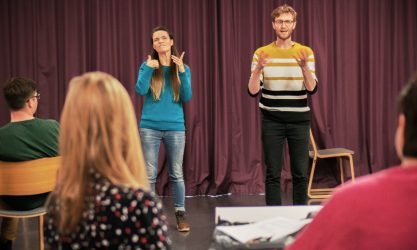This year’s Bilingualism Matters Edinburgh Annual Event took place on Friday 7th June at the Edinburgh Centre for Carbon Innovation. To mark the 2019 UNESCO Year of Indigenous Languages, our programme of speakers focused on Scots, sign languages and Gaelic.

The first talk presented insights into the Scots language, as Dr Neil Kirk from Abertay University gave some background along with an overview of his research with “Are we speaking the same language? Hidden bilingualism in Scots speakers“. This was followed by “New sign languages: where do we find them, and how do they grow?” with Dr Marieke Schouwstra from the University of Edinburgh, which discussed fascinating research into the evolution of sign languages. Finally, our director Prof Antonella Sorace gave an update on Bilingualism Matters research particularly as it relates to Scottish Gaelic, and left the audience in no doubt that Gaelic really does matter.

Attendees then took a break from listening and joined facilitator-led themed table discussions, where they were asked to brainstorm future directions for our Bilingualism Matters branch. The themes were art, education, families, health, indigenous languages and migration. The discussions were immensely productive and will help us with our plans for coming years.

Following the animated discussions, the audience were treated to a short theatre performance that challenged perceptions of British Sign Language (BSL). “In Burrows” took us all on a captivating journey, performed in spoken English and translated into BSL.

The final hour of the event was dedicated to exhibitions, posters and informal conversations with refreshments. Marieke Schouwstra brought her 3D imaging equipment for a demonstration of her research; the Deaf Heritage Collective joined us with information on their work communicating the hidden heritage of Scotland’s Deaf culture; Marion from Theatre Sans Accents presented information on the Edinburgh Multilingual Stories Festival; and our own Bilingualism Matters volunteers demonstrated some of the fabulous activities they have developed for our events.
We also had a poster display on a wide range of topics and projects related to bilingualism and Bilingualism Matters, all of which can be viewed here (pdf).

You can check out the full programme (pdf) for more information on contributors and you can see all the photos from the day on our Facebook album.
Thanks to everyone who contributed to making the day such a success. Keep tuned for details of next year’s event!










